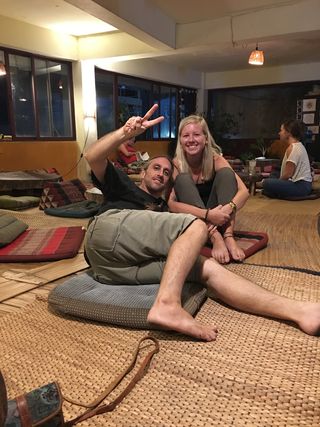Relationships
Is Unconditional Love Really Possible?
Are you setting yourself up for disappointment in love?
Posted January 2, 2018 Reviewed by Ekua Hagan

The ideal of unconditional love is a noble one. We want to be loved as we are, and perhaps we’d like to see ourselves as capable of selfless love.
Unfortunately, loving unconditionally may set us up for disappointment and shame when our ideal doesn’t match the reality of how difficult — or perhaps impossible — it is to love unconditionally.
Children need to be loved without conditions. As they struggle through life, we need to be unendingly patient — taking many deep breaths, and offering guidance repeatedly. Embodying a consistently loving, accepting presence, we create a climate for safe attachment. As adults, we also desire and need safe relationships. Opening our hearts, we want to trust that a beloved partner or loyal friend will be there when we need them.
However, if we look too fervently and exclusively to one person to fill all our needs (for acceptance, belonging, meaning), we may be expecting something that one person cannot provide. Taken to an extreme, we may echo the silent plea of the narcissistic child: Love me and supply what I need ... despite how I treat you.
Clinging to a sense of entitlement, we may fly into blame or rage when our partner’s needs clash with our own. For better or worse, mature love can only thrive under certain conditions. Just as a rose needs ample sun, water, and nutrients to survive and flourish, we cannot expect love to thrive under sterile or hostile conditions. There needs to be (enough) mutuality.
Honoring Boundaries
Loving doesn’t mean always supplying what another person wants, being tirelessly accepting, and having no needs of our own. An immature view of love saddles us with the obligation to satisfy every need, soothe every sorrow, and comply with every request — and we wind up berating ourselves for not being spirituality evolved if we fall short of that ideal.
The challenge in every healthy relationship is being responsive to our partner while also affirming our own needs and longings. This means honoring ourselves enough to have limits and set boundaries — being willing to respond with our own “yes,” our “no,” and our “maybe.”
Loving means being sensitive to the space between ourselves and others — being respectful, attentive, and attuned to each other’s feelings and wants. It means slowing down, staying connected to our body, and allowing ourselves to be affected by what others feel and want.
Love asks us to take another’s requests seriously and to make them happy if we can do so without harming ourselves. It doesn’t mean feeling obligated always to say “yes.” But it does mean that declining a request must be done with respect and sensitivity, rather than in a harsh or dismissive way, which damages trust. Or it means working things out so that both of our needs can be met.
If our partner wants us to visit our difficult in-laws, we can decline with empathy and kindness. We can vulnerably express our fears and concerns, which allows our partner to understand and respond to our needs and wants.
A key to the elusive intimacy we seek is letting ourselves be seen while seeing another’s inner life. The process of sharing and being responsive to our respective inner worlds is usually more important than the outcome.
Dancing With Fire
Love requires an expansive and spacious presence. It cannot flourish if we ignore or minimize our partner’s needs. But neither can it thrive if we deny our own desires, which can create resentment. Part of a loving bond is trusting that our partner is strong enough to experience occasional disappointment when we’re not inclined to be accommodating — and trusting that being true to ourselves won’t damage the relationship, as long as we do it kindly.
A healthy relationship doesn’t mean fusing or merging. We’re separate people who have differences that require respect. The popular view of unconditional love fails to recognize the importance of developing frustration tolerance when things don’t go our way. Relationships become stronger when we both have a capacity for self-soothing — taking care of ourselves emotionally when soothing from others is not forthcoming.
Love cannot mean that our partner must deny their desires in order to accommodate us. Nor can it mean suppressing our own longings in order to wear the spiritual badge of honor of being unconditionally loving. In this way, partnerships are equivalent to dancing with fire (which is why I titled my book as such). There’s the fire of another’s burning needs and that fire of our own desires. Working with how our desires interact is a central part of the art of loving.
Self-Honesty
Love cannot thrive without courageous self-awareness and rigorous self-honesty. Is our “no” payback for perceived injuries? Are we perpetuating a power struggle? Have we stored up hurts and resentments that leak out?
Healthy relationships require knowing our feelings, our limits, and our motivations. Is it really too painful to visit our in-laws? Or do we want our partner to feel the pain we’re carrying from some past event?
The greatest gift we can give another person is the gift of our own personal growth. The more we know ourselves and develop the courage and skills to communicate our inner experience, the more that trust and love can flourish.
Mutual Loving
It may be unwise and impossible to love unconditionally in the sense of staying with a partner no matter how poorly they treat us, or how destructive it is for us (being severely depressed or suicidal). But if we define unconditional love as follows, I’m all in, although I prefer the less grandiose term “mature love,” as defined in The Authentic Heart:
- We’re committed to the process of open, honest, nonviolent communication.
- We’re committed to offering a sacred, spacious, non-defensive presence — listening as best we can, and taking our beloved's feelings and wants seriously, while also expressing our own.
- We’re moved by love and caring, not duty or obligation.
- Love overrides little annoyances that occur in every relationship. We accept differences and work with them skillfully.
- We share power. We don’t always get exactly what we want.
“Unconditional love” can set us up for something unattainable. We have a need not only to love but also to be loved. Rather than pursuing an unrealistic ideal, we can pursue a path that enables us to be attentive to others, while also being responsive to our own legitimate longings.
© John Amodeo
Facebook image: Syda Productions/Shutterstock




